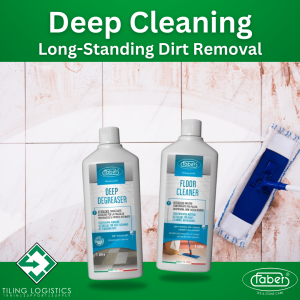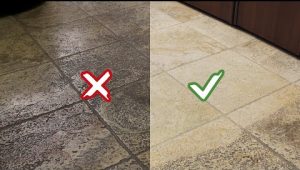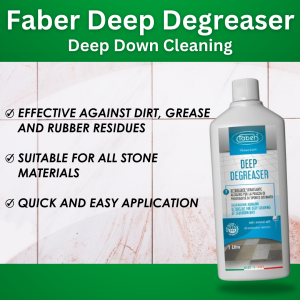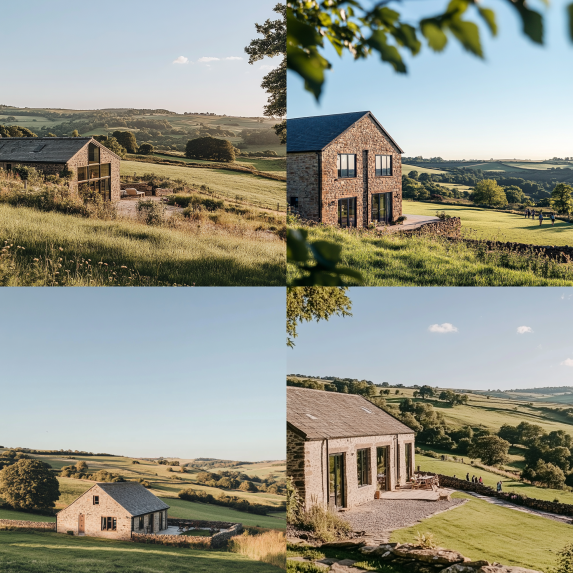We use cookies to ensure that we give you the best experience on our website. If you continue to use this site we will assume that you are happy with it. Learn more
How to Clean a Old & Dirty Stone Floors in 5 Steps
How to Deep Clean Old & Dirty Stone Floor
How to Deep Clean Old & Dirty Stone Floor in 5 Steps

Cleaning old tiles is always an enticing idea. Uncovering the hidden beauty below layers of dirt is a thought that makes the motives many take on the task.
However, when working with old stone tiles, you'll quickly discover that a mop and vacuum just aren't cutting it.
What you need is a deep cleaning solution that tackles the more stubborn and long-standing dirt, stains and grime.
In this article, I will take you through a step-by-step guide explaining how to deep clean any stone floor.
This method uses easy-to-use equipment, making it perfect for DIY while achieving results you’d expect from a professional.

To hear more information about cleaning any kind of stone floor, don’t hesitate to get in contact. We are always more than happy to answer any questions. To speak to our team, give us a quick call at 0121 773 9129 or send a message online.
Deep Cleaning old tiles with the right tools
First of all, you need Faber Deep Degreaser. For deep cleaning of dirt that has been walked in and around your property. It removes even the most stubborn of dirt from all stone surfaces.
Get rid of
- Grease
- Dirt
- Rubber Residues
- Surface Patina
It actually melts and removes even the dirt caught by the micro-porosity of the surface.
You will also need a white emulsifying pad and mop alongside this deep-down floor cleaner.
Any Stone Surfaces means ANY stone surface
Fortunately, Deep Degreaser is ready to use on all surfaces. While it is tough on dirt, this floor degreaser is gentle on surfaces. As a result, this cleaning detergent is suitable for even the most sensitive surfaces. This includes polished marble and polished porcelain or ceramic tiles. This grime and grease remover is also gentle on grout width.
Before applying this grease remover, ensure surfaces are free of any debris, dust or coarse dirt. You can do this with a vacuum cleaner or broom.
Deep Degreaser is also suitable for both outdoor and indoor surfaces.
Deep Down Degreasing - How to get rid of long-standing and stubborn dirt on old tiles
1. Dilute Faber Deep Degreaser
Dilute the deep-down cleaner with clean water.
Dilution Guide:
- Standard use - 1:3
- Stubborn residues - 1:2
- Extreme cases - Use undiluted
2. Apply Faber Deep Degreaser
Pour the resulting solution onto the surface in manageable amounts at a time. Distribute the solution using a white emulsifying pad.
3. Let the solution to act
Allow 10-20 minutes for the deep cleaner to act on the stone. During this time, you should continue to scrub the floor with the white pad. Be sure to get into the grout during this time as well.
Afterwards, you’ll need to wait another 15 minutes without touching the floor.
4. Get rid of the residues
Wipe away the remaining residues with paper towels.
5. Rinse the floor
Using a mop, thoroughly rinse the floor with plenty of water.
Get Started Now
There you have it: the 5 simple steps to deep cleaning any stone floor. Now its your turn.
Don’t put up with dirt, grime and grease anymore, your surfaces can look so much better.
Buy Faber Deep Degreaser for quick and easy deep cleaning today.
After Deep Cleaning Stone Floors
We suggest using Faber Neutral Cleaner or Floor Cleaner for cleaning stone floors after using Deep Degreaser.
As ph-neutral cleaners, they wash away ingrained dirt without harming the tile or grout.
For standard maintenance cleaning, dilute the solution 1 capful with 5L of clean water. On more absorbent surfaces, then you can mix 2-3 capfuls of the floor cleaners with 5L of clean water.
Apply either cleaning solution with a standard mop.
How is Faber Deep Degreaser Different?
Faber Deep Degreaser is a concentrated degreaser cleaning detergent. Faber Deep Degreaser comes as a result of over 30 years of experience in the surface care industry. To ensure each of their products achieves nothing but the best results, Faber spent these years designing, creating and testing each product.
While traditional surface cleaners are good for removing small amounts of dirt and cleaning fresh stains, they cannot often completely clean bigger or older problems. For a genuine, unique and most importantly, effective deep cleaner look no further than Faber Deep Degreaser. To get deep into a surface and clean them from within and on top ensuring, that all dirt, grease and oil is gone, deep cleaning is the way to go.
This fact has never been more true than with Deep Degreaser. Where its competitors on the market merely wash away dirt, this degreaser cleaner actually melts and removes dirt on surfaces.
Thanks to its extraction action, this floor cleaner even removes dirt cached by the micro-porosity of the surface. This extractive action also guarantees Deep Degreaser removes long-standing dirt that built up over many years.
What can Faber Deep Degreaser do?
As a deep-down cleaner, you can expect this floor-degreasing agent to remove dirt deep within the material on old stone flooring.
Generally, walking it around from one surface to another leads to the build-up of dirt. Thankfully, Deep Degreaser effortlessly dissolves long-standing dirt found in high-traffic areas and grease and grime that clings to the material.
This grease remover completely removes even large amounts of grease and dirt. Deep Degreaser also gets rid of rubber and tire residues left behind on surfaces making it suitable for large outdoor areas. Additionally, this deep cleaning detergent also is capable of removing surface patina.
Barn Conversions to Century Home Renovations
Landlords and property investors are keen, their industry knowledge is both intrinsic and intuition; based on experience.
Faber, a well-regarded name in the cleaning industry, has built a strong reputation for producing high-quality cleaning products, particularly for stone surfaces. Their products are well-known for their effectiveness, reliability, and the ability to preserve the natural beauty of stone materials. Faber offers a wide range of cleaning, maintenance, and protection products tailored for different types of stone surfaces, including marble, granite, and stone tiles.
This reputation is reinforced by positive reviews from both domestic and professional users who appreciate the thorough cleaning and protective benefits of Faber products.
Central England Countryside Properties To Renovate and Restore
Identifying the Material of the Kitchen Wall Tiles
The numbers speak for themselves. Well-executed barn conversions in prime rural locations can yield returns of 8-12% annually, outperforming many traditional property investments. With the staycation trend showing no signs of slowing, there's never been a better time to enter this niche market. Let's say the location of the barn is in Derbyshire, it's very likely that the tiles are made from materials commonly mined in the region during the 19th century. Derbyshire is known for several types of stone:
- Limestone: Widely available in Derbyshire, especially in the Peak District, limestone was a common building material.
- Sandstone: Another prevalent material in Derbyshire, often used for both structural and decorative purposes.
- Slate: While not as common as limestone and sandstone, slate was also used in various applications, including roofing and sometimes tiling.
- Clay Tiles: If the tiles are not stone but ceramic, they could be made from locally sourced clay, which was also used historically.
Barn conversions are a property investment, it's not just about buying bricks and mortar – it's about creating experiences that resonate with the market. And in today's world, authenticity and character are commodities in high demand. Here's a a renovation outline for stone; first identify the rock.
Difference Between Porous and Non-Porous Stone
Porous Stone:
- Characteristics: Porous stones have tiny holes or pores that can absorb liquids and gases. Examples include limestone, sandstone, and marble.
- Pros: These stones often have a natural, aesthetically pleasing appearance and can add character to a space.
- Cons: They are more susceptible to staining, water damage, and require more maintenance and sealing to protect against moisture and spills.
Non-Porous Stone:
- Characteristics: Non-porous stones do not have pores and thus do not absorb liquids. Examples include granite, slate, and certain types of quartz.
- Pros: These stones are easier to maintain, more resistant to stains, and generally more durable against moisture and spills.
- Cons: They might not have the same natural look as some porous stones and can sometimes appear less textured or varied.
When renovating a centuries-old barn in England, especially one with historical stone flooring tiles, preserving the character and integrity of the stone is crucial. One of the most effective ways to protect these valuable surfaces is by sealing them properly. This not only preserves their appearance but also prevents future damage.
Product Recommendations and Volumes
One of the key challenges in barn conversions is preserving historical features while ensuring modern comfort. The original tiles, often centuries old, present a particular hurdle. This is where strategic partnerships with specialist suppliers come into play.
Faber, a leader in stone care products, offers a suite of solutions tailored for this exact scenario:
- Faber 30: An alkaline degreaser for deep cleaning
- Faber Tile Cleaner: For tackling stubborn, ingrained stains
- Faber Deep Degreaser: Essential for areas with heavy residue
- Faber Clean 360: A neutral cleaner for ongoing maintenance
- Faber Safe Floor: To ensure guest safety on stone surfaces
- Faber Protex: A high-quality sealant for long-term protection
The ROI Equation
While the initial outlay for quality restoration products may seem steep, it's a fraction of the overall investment and crucial for a good return of flipping - if you don't want to run it yourself for returns. A well-maintained property not only commands higher nightly rates but also garners better reviews, leading to increased bookings and repeat customers. It's a lifetime of revenue, and the business can be handed down to your family.
Try to keep as many unique features as possible - this could be a water well inside the house, or a flagstone flooring
The key to success in this market is differentiation. By preserving original features like exposed beams, restored tiles or feature enhancements, you're not just offering accommodation – you're selling an experience. This unique selling proposition allows for premium pricing, potentially 30-40% above standard holiday lets in the same area.
For the innovative investor, this is eminently scalable. Start with one barn, refine your process, and expand to a portfolio of properties. When it comes time to exit, you'll find a ready market of buyers attracted to turnkey operations with proven track records. Likewise, this will work as a one-off project.
Why do I need to seal the stone tiles?

Stone flooring, particularly when it's several centuries old, is vulnerable to staining and water damage. Over time, exposure to water, dirt, and daily wear can cause these beautiful tiles to lose their original charm and structural integrity. This is a significant concern for property developers, especially when restoring a property intended to be a luxurious Airbnb.
Q: Why Have I got To Seal Stone Tiles? Q: How Long Does It Last? 3 to 5 years
The longevity of a stone sealer depends on several factors, including the type of sealer used, the amount of foot traffic, and the environment in which the stone is placed. Generally, you can expect:
- Penetrating/impregnating sealers (which soak into the stone’s pores) to last 3 to 5 years or more.
- Topical sealers (which form a protective layer on the surface) usually last around 1 to 3 years.
How to Seal Stone Tiles - Prevent Staining and Water Damage
By applying a high-quality impregnating sealer, you can create an invisible barrier that protects these stones from the inside out. Products like SRP Impregnator Premium are designed to penetrate deep into the stone, filling its natural pores and preventing liquids from being absorbed. This keeps the stone safe from staining, water damage, and ingrained dirt while maintaining its natural, historical appearance.
The Benefits of SRP Impregnator Premium
- Invisible Protection: SRP Impregnator Premium forms a colourless, breathable barrier that won't alter the stone's appearance. This is particularly important in a renovation where maintaining the authentic look of the stone is key.
- Long-Lasting Results: Once applied, this sealer provides long-lasting protection without the need for frequent reapplication. The chemical bond it forms with the stone ensures durability, making it ideal for high-traffic areas like a kitchen in a busy Airbnb.
- Ease of Maintenance: After sealing, the stone tiles will be much easier to clean and maintain. Dirt and spills won’t penetrate the surface, allowing for quick and straightforward cleaning.
Why Choose Impregnating Sealers?
Impregnating sealers are essential for protecting natural stone tiles because they offer protection without compromising the stone’s natural beauty. They allow the stone to "breathe," preventing moisture from being trapped inside, which is particularly important in older structures where the stone needs to maintain its natural breathability to prevent damage.
In high-traffic areas or spaces exposed to harsh conditions, such as outdoor patios, resealing may need to be done more frequently. To maintain the seal, you can perform a simple water drop test: if the water doesn’t bead on the surface and absorbs into the stone, it’s time to reseal.
Stone flooring, particularly when it's several centuries old, is vulnerable to staining and water damage. Over time, exposure to water, dirt, and daily wear can cause these beautiful tiles to lose their original charm and structural integrity. This is a significant concern for property developers, especially when restoring a property intended to be a luxurious rental. The last thing you want is for these historic tiles to suffer from unsightly stains or become damaged.
By applying a high-quality impregnating sealer, you can create an invisible barrier that protects these stones from the inside out. Products like SRP Impregnator Premium are designed to penetrate deep into the stone, filling its natural pores and preventing liquids from being absorbed. This keeps the stone safe from staining, water damage, and ingrained dirt while maintaining its natural, historical appearance.
For your barn renovation, sealing the stone floors with an impregnating sealer like SRP Impregnator Premium ensures that these historical features are preserved for many years to come, adding both beauty and value to the property. This investment in quality sealing not only safeguards the stone against future damage but also enhances the overall appeal of the restored barn, making it a standout feature in your luxurious Airbnb offering.
2024 sales of barn conversions in Nottinghamshire show a range of prices depending on the size, location, and level of luxury of the property.
Here are a few examples from Q3 of 2024:
A three-bedroom barn conversion in Long Eaton was listed for £450,000, featuring historical charm and modern amenities (OnTheMarket).
A four-bedroom barn conversion in Cromwell, near Newark, was listed for £659,950, with extensive parking and scenic surroundings (OnTheMarket).
More luxurious options, like a five-bedroom barn conversion in Oxton, NG25, came with a guide price of £900,000, offering underfloor heating and spacious accommodations(OnTheMarket).
https://www.onthemarket.com/farms-land/barn-conversion/nottinghamshire/
Learn More - Why Tiling Logistics?
Here at Tiling Logistics, we are very passionate about surface care, so much so that our team members have devoted over 30 years to it. This 30-year worth of first-hand experience has granted us a great understanding of stone and tile surface care.
After this time, we have developed an understanding of the best tools, products and methods for any surface treatment. Due to this, we are sure to have the best advice for you regardless of whether you are working on a commercial, industrial or domestic property.


